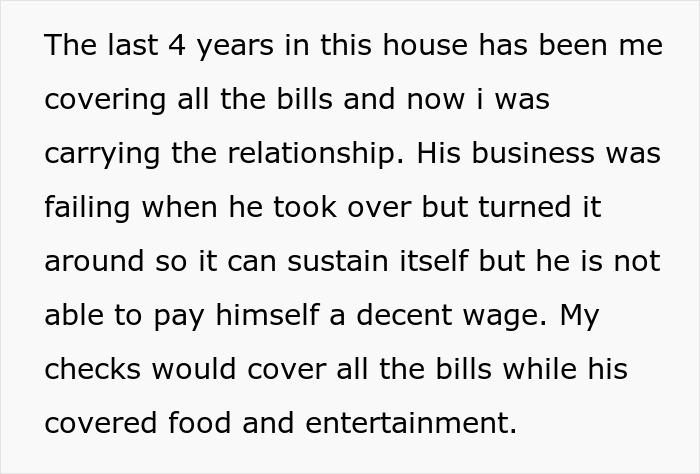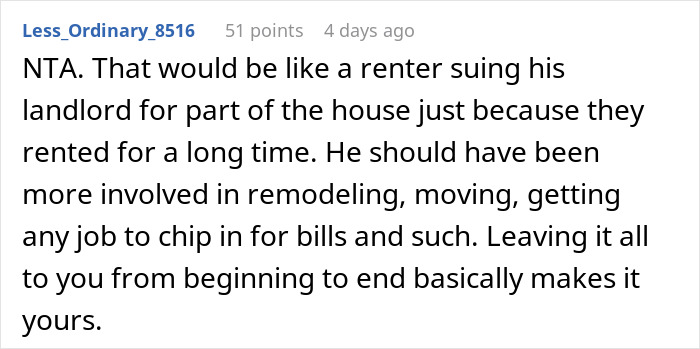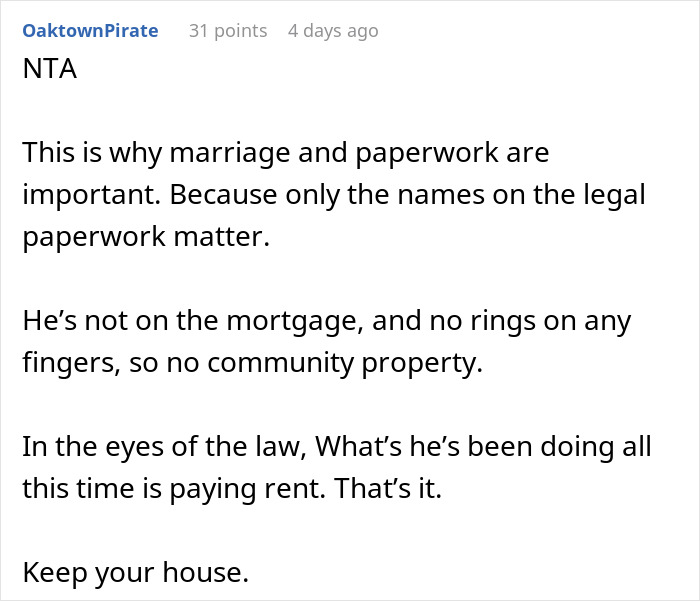So, you can imagine just how hard breakups are in and of themselves without complicating it with all of the worldly stuff that comes with it, like how you will divide up your Pokémon collection. Or the house. Well, this one Redditor recently broached the topic on r/AmITheA-Hole, asking folks for some perspective on whether his ex’s demands to split their home equally, despite the partner not really contributing all that much, were fair.
Breakups are hard as they are without having to think about everything else that they affect, i.e. splitting shared belongings
Share icon Image credits: Zinkevych_D / envanto (not the actual photo)
And while there are ways to split a house, there’s also loads of nuances to consider, like what if you didn’t really contribute to it?
Share icon Image credits: Maria Ziegler / unsplash (not the actual photo)
Image source: fwosamwise
There were even threats of being sued, but the author of the post felt confident about their position
A man recently approached Reddit for some perspective on how he ought to approach his ex partner’s demand to split the house. Long story short, the two aren’t married, don’t have kids, but have a mortgage. Specifically, one of them has—OP—for their home, but he is also pretty much the sole contributor to it as well. Despite barely contributing, OP’s now ex demands he sell the house and split the money 50-50. The issue soon found its way onto Reddit, where folks said OP is in the clear across the board. They said that since there is no legal, financial or any other contributional basis, then the ex can’t even dare to do anything about it. And OP actually pointed out that they threatened him with an attorney, to which OP hired his own and he is more than happy to “destroy him.” Others called the ex out for being a parasite. Not only did OP subsidize his lifestyle to some degree, he now dares to demand something that he had no hand in—that has mooch written all over it.
In the US, generally speaking, if your name is on something, you own it, and that’s the extent of it
Without getting too much into legalese, the general gist of property ownership laws is if there’s a document with your name on it, it’s yours. And if there is no document, if you inherited it, paid for it with money you earned, or got it as a gift, it’s yours. There is one exception to the rule, and that is in the case of widowing. A surviving spouse can claim either one third or one half of property in case of their significant other’s death, no matter what the will says. This is, however, not the case here as there is no marriage. There are alternatives, though, like joint ownership. It’s essentially having both of your names on the title deed. If you do, each owns half-interest in the property. There is some nuance as to what that means based on whether it’s joint tenancy, tenancy by the entirety and tenancy in common, but it’s shared ownership regardless. There’s also community property—property that’s owned equally by the spouses—whereby it’s not just houses and land, but also money that’s generated within a marriage all belongs to both of the partners. However, the keyword here is marriage. Also, community property varies from state to state and there’s only a handful of them that actually have it in force. So, with all of this in mind, what are your thoughts on any of this? Who would you side with? Share your takes and personal stories in the comment section below!
The internet declared the author of the post to be in the clear
Anyone can write on Bored Panda. Start writing! Follow Bored Panda on Google News! Follow us on Flipboard.com/@boredpanda!
































